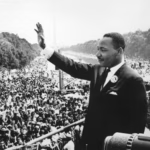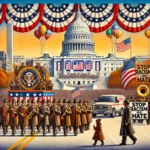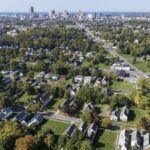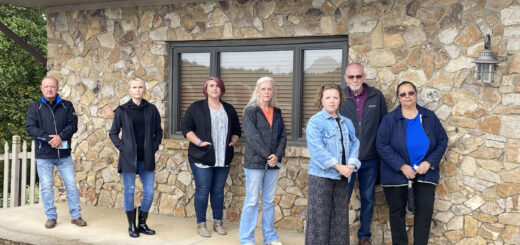Speaking Truth to Power
When Henry Louis Taylor Jr. was a little boy, he remembers his father posing enigmatic but probing questions. “He would always ask me things like, ‘Son, what victories will you win for humanity?’ he says. “‘How will you change the world?’”
During a distinguished career in academia and in the community, Taylor has taken those questions to heart. He earned master’s and doctoral degrees in urban history at UB and is founding director of the university’s Center for Urban Studies and professor of urban and regional planning in the UB School of Architecture and Planning. His research there touches on both theoretical studies and practical matters like addressing distressed urban areas and studying the factors behind their exploitation and underdevelopment. A member of the UB faculty for more than 30 years, Taylor continues to bring his impassioned perspective on urban life and racial justice to both the university and the city he calls home.
Activist Scholar
Indeed, the concept of “activist scholar” is the driving force in his life. “The goal of activist scholars is to consciously produce and implement knowledge for social change,” he wrote when accepting the 2018 Marilyn J. Gittell Activist Scholar Award. “The intent is to understand the world, so that we can change it.”
UB and Buffalo are singularly fortunate to have benefited from Taylor’s vision, resolve and insight for so long. And yet he could easily have wound up somewhere else—he could very well have not been an activist at all.
Taylor was born in Nashville and grew up on the campus of Tennessee State University, a historically black university where his father was a professor of agricultural economics. But although he was raised among the city’s leading Black professionals and intellectuals during the civil rights movement of the 1950s and early ’60s, “I didn’t think too much about racial segregation,” he says. He took his father’s urging to serve society another way: He became a clinical audiologist.
Understanding His Destiny
But as a young man in the late ’60s, something clicked. “I started to feel different. I remember telling a friend of mine, ‘Man, I don’t like this Negro thing anymore—I like to think of myself as Black.’ I thought something weird was happening to me. I was relieved when I found it was happening to other people as well. I felt powerful, free, liberated. I got a copy of Stokely Carmichael’s ‘Black Power’–I needed to understand. Read that book in one day, started to read everything I could get my hands on.”
Very suddenly, Taylor had become radicalized. “I understood then my destiny,” he says. “To become a warrior for my people.”
Taylor gave up his career in audiology. Realizing he couldn’t “fight for the liberation of our people if I don’t understand our oppression,” he decided to get a history degree. After gaining admission to UB, he took four years of coursework in history “to deepen my understanding of Black urban history and Latin American colonial history,” Taylor says.
Following this coursework, he took a leave of absence from his graduate studies to organize Black workers in Cincinnati. While there, he worked as a learning specialist at the University of Cincinnati and later became an administrator at the UC medical school, where he was responsible for recruiting, mentoring and providing academic support for Black and Latino/a students. He finished his PhD while in Cincinnati and later taught at Ohio State.
Taylor was happy at Ohio State when UB called with a job offer, but the university persisted, and when it promised him full backing for what would become the Center for Urban Studies, he took the leap. It was 1987. “Once I got here,” he says, “my journey was over.”
The Journey Continues
Or rather, his wandering was over; Taylor’s journey continues. The center is a research, neighborhood planning and community development institute that identifies the huge racial inequities in economic opportunity, health, policing and overall quality of life in Buffalo. Working with the city and county governments as well as NGOs and grassroots groups, it aims to transform vulnerable and underdeveloped neighborhoods, and played a key role in efforts to revitalize the University Heights area. “We have also been involved in work in the Fruit Belt community in School 37, Futures Academy. Working with the school, we transformed an entire city block into a park and community garden,” Taylor says.
Taylor has long been widely esteemed as a speaker of truth to power. That may be more true than ever today, whether he is commenting on UB’s struggles to provide support for its long-declining numbers of Black, Latino/a and Indigenous faculty and students or the latest national reckoning with racial injustice.
Of last spring and summer’s protests, Taylor says, “The outrage of people and even the destruction of property is a reaction against the symbols of oppression and exploitation.” And he dismisses assertions by politicians that the demonstrations were fomented by “outsiders,” he says. “You don’t need outsiders to do that—the police are very good at that themselves.”
Optimistic for the Future
Taylor calls himself a scholar, an activist, a dreamer—and an optimist. “I feel that the future is in good hands,” he says. “I’m energized by the fact that the Floyd rebellions have transformed the way white people think and respond. It’s beautiful.”
And looking back, he measures his accomplishments in what he did for his people, and for humanity.
“I have lived my life,” Taylor says, “in a way that I think my father would be proud of.”
Very suddenly, Taylor had become radicalized. “I understood then my destiny,” he says. “To become a warrior for my people.”
Taylor continues to bring his impassioned perspective on urban life and racial justice to both the university and the city he calls home.
Author Profile
Latest entries
 Henry Louis Taylor, Jr.01/20/2025Reflections on Martin Luther King, Jr.’s Dream
Henry Louis Taylor, Jr.01/20/2025Reflections on Martin Luther King, Jr.’s Dream Henry Louis Taylor, Jr.01/09/2025The Trump Inaugural Parade is a Political Event
Henry Louis Taylor, Jr.01/09/2025The Trump Inaugural Parade is a Political Event Henry Louis Taylor, Jr.05/04/2024The Occupation of Hayes Hall: Student Rebellions and Remaking the U.S. UniversityThe Occupation of Hayes Hall
Henry Louis Taylor, Jr.05/04/2024The Occupation of Hayes Hall: Student Rebellions and Remaking the U.S. UniversityThe Occupation of Hayes Hall Henry Louis Taylor, Jr.03/21/2024Ryan’s infill housing strategy is the right plan for Buffalo
Henry Louis Taylor, Jr.03/21/2024Ryan’s infill housing strategy is the right plan for Buffalo


